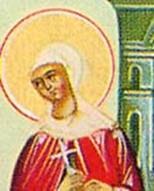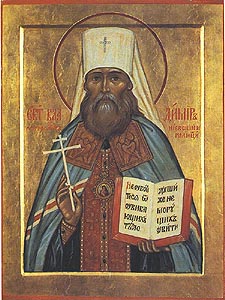|
|||
|---|---|---|---|
| This weekly bulletin insert complements the curriculum published by the Department of Christian Education of the Orthodox Church in America. This and many other Christian Education resources are available at http://dce.oca.org. | |||

Two saints, one very early and one relatively recent, have a good deal in common. They are Theodula of Anazarbus and the New Hieromartyr Vladimir of Kiev, Metropolitan. Though Theodula lived in the 4th century and Metropolitan Vladimir in the 20th, they shared a trait of many saints: deep and authentic humility. But also like many saints, they did not lead quiet lives, as most humble people would like to do. They had to take public, unpopular and dangerous stands in order to defend the faith. Theodula's very name implies humility, since it means "handmaiden of God." She lived during the reigns of two successive third-century Roman emperors who persecuted Christians, and would have preferred to worship Christ without attracting attention. But she was arrested and ordered to honor the pagan gods. Her refusal was firm, yet full of humility as she asked God to help her endure torture, never assuming she could manage it on her own. One of her persecutors, Helladius, was so affected by this combination of humility and courage that he became a Christian, and they both eventually became willing martyrs for Christ. Metropolitan Vladimir was born to a priestly family in the Russian province of Tambov in 1848. He was a timid child, sometimes hiding from visitors. Academically gifted, he studied and then taught for several years. He received ordination relatively late, at age 34. He began serving a quiet provincial parish, which suited him and his beloved wife and child very well. But in 1886 both his wife and child died. It seemed natural, then, to be tonsured a monk. His gifts and character led to his consecration as a bishop, and from 1898 to 1912 he served as Metropolitan of Moscow and Kolomna. During these years in a prestigious position he wrote, "To be humble means to know nothing about our talents or any other benefits we have above others, but rather consider them to be the grace and gifts of God..." But these were also years of growing and sometimes violent unrest in Russia. In this uncertain and dangerous atmosphere, the humble bishop who'd been a timid child acted courageously many times. He visited factories, encouraging workers to live as Christians rather than embrace radical socialism as activists were urging them to do. He firmly denounced as un-Christian a popular document called "The Protocols of the Elders of Zion" which was produced by revolutionaries to incite anti-Semitism, and which falsely claimed to be written by Jewish leaders planning to dominate the world. (Henry Ford liked it; he printed and distributed 500,000 copies.)
In 1918, opposing forces of the Russian Revolution were vying for control of Kiev, to which Metropolitan Vladimir had been transferred. Soldiers attacked his monastery and dragged him to a brutal death, making him the first bishop to be a martyr of the Revolution. The Church honors his outspoken courage, and also the way he lived by his own humble words: "Not to me, O Lord, but to Your name be the glory." |
|||

